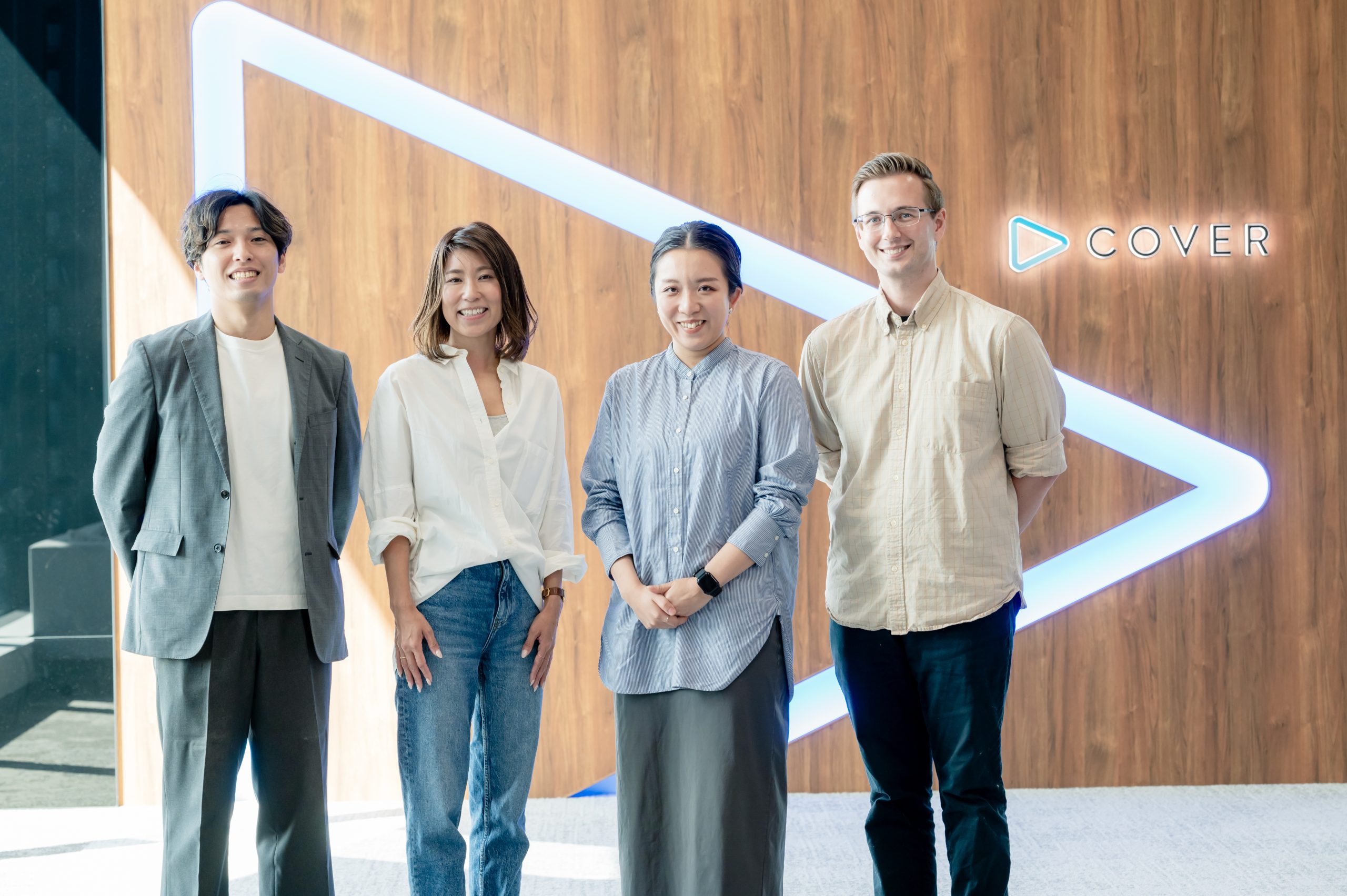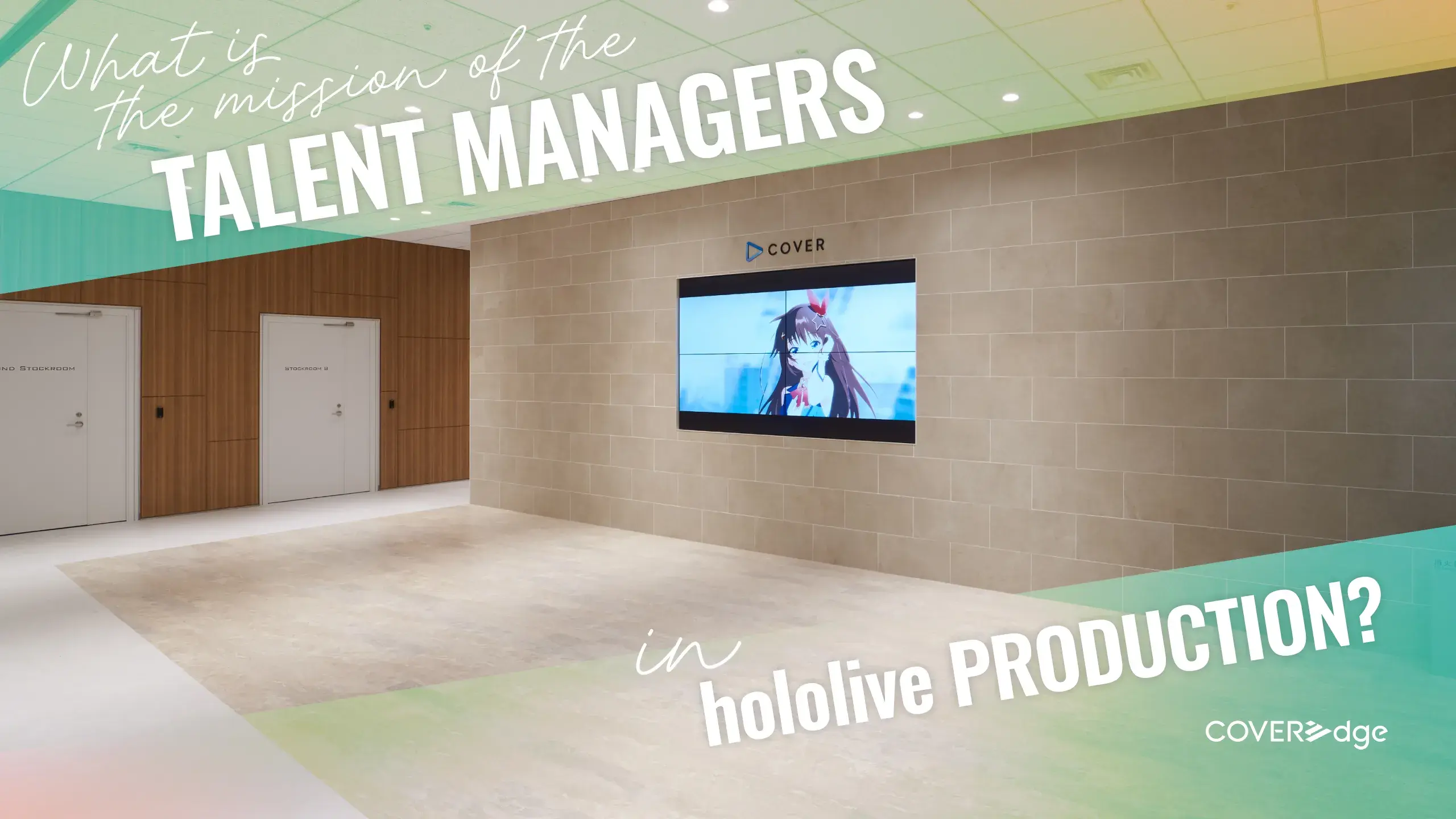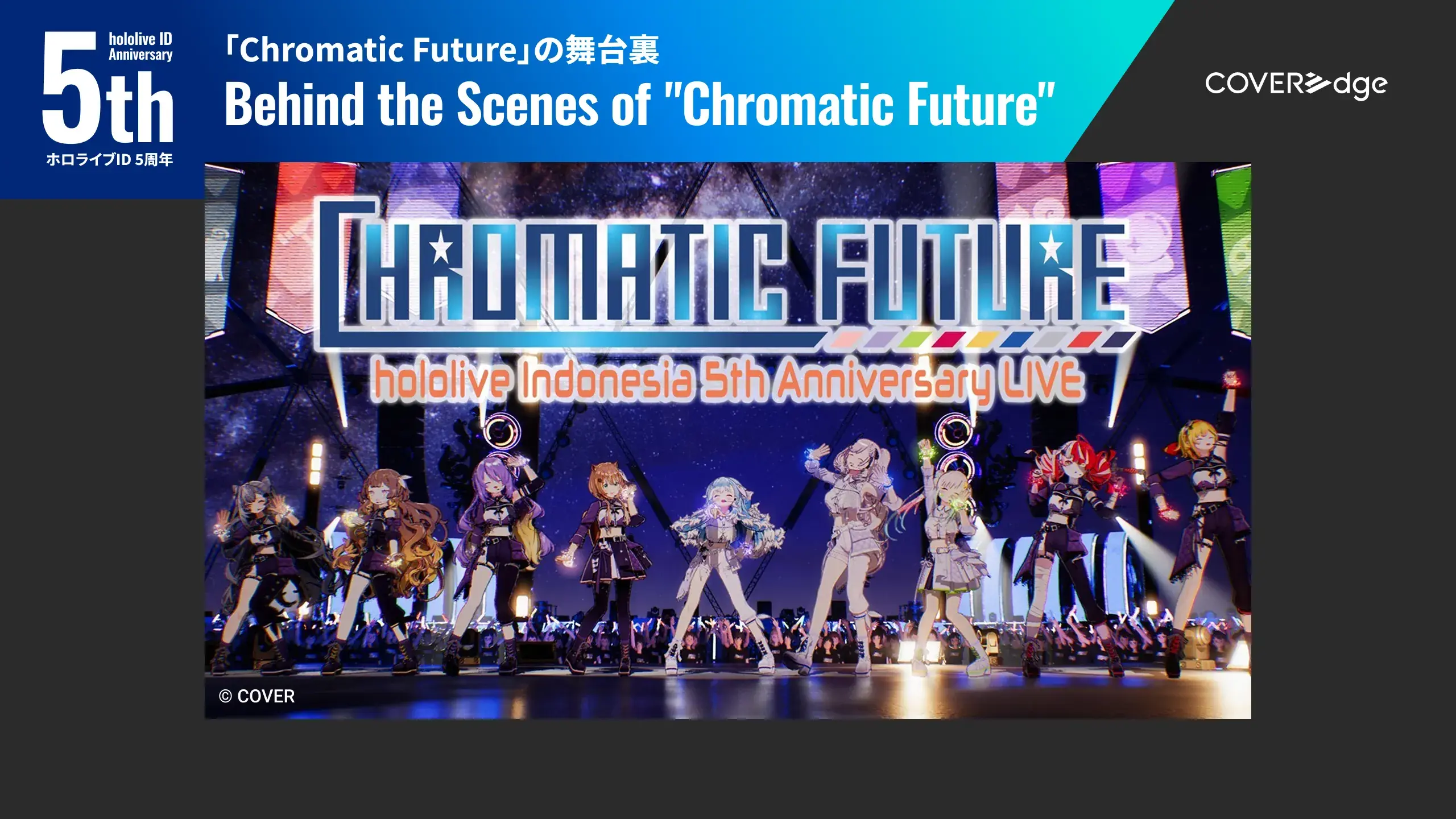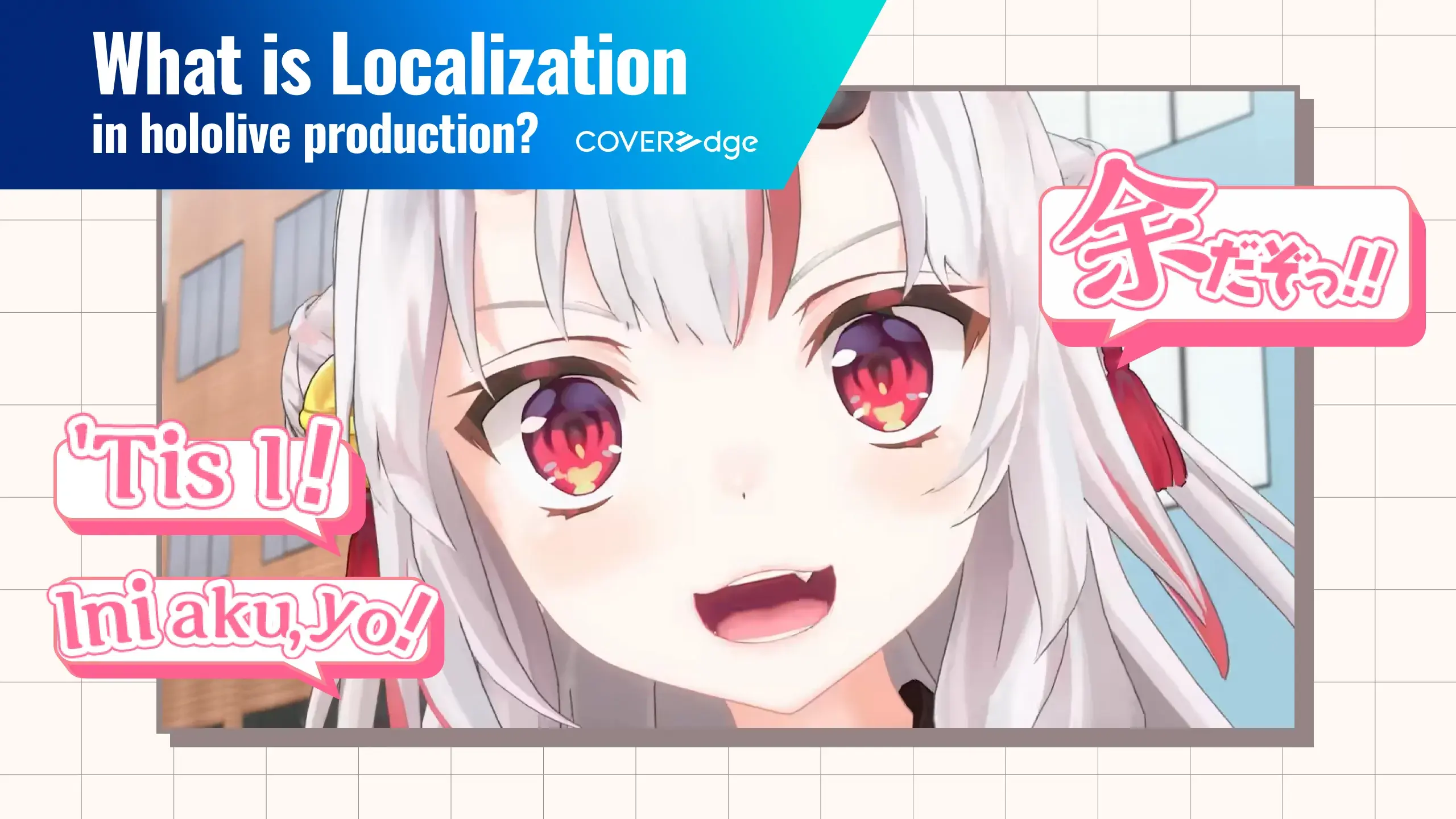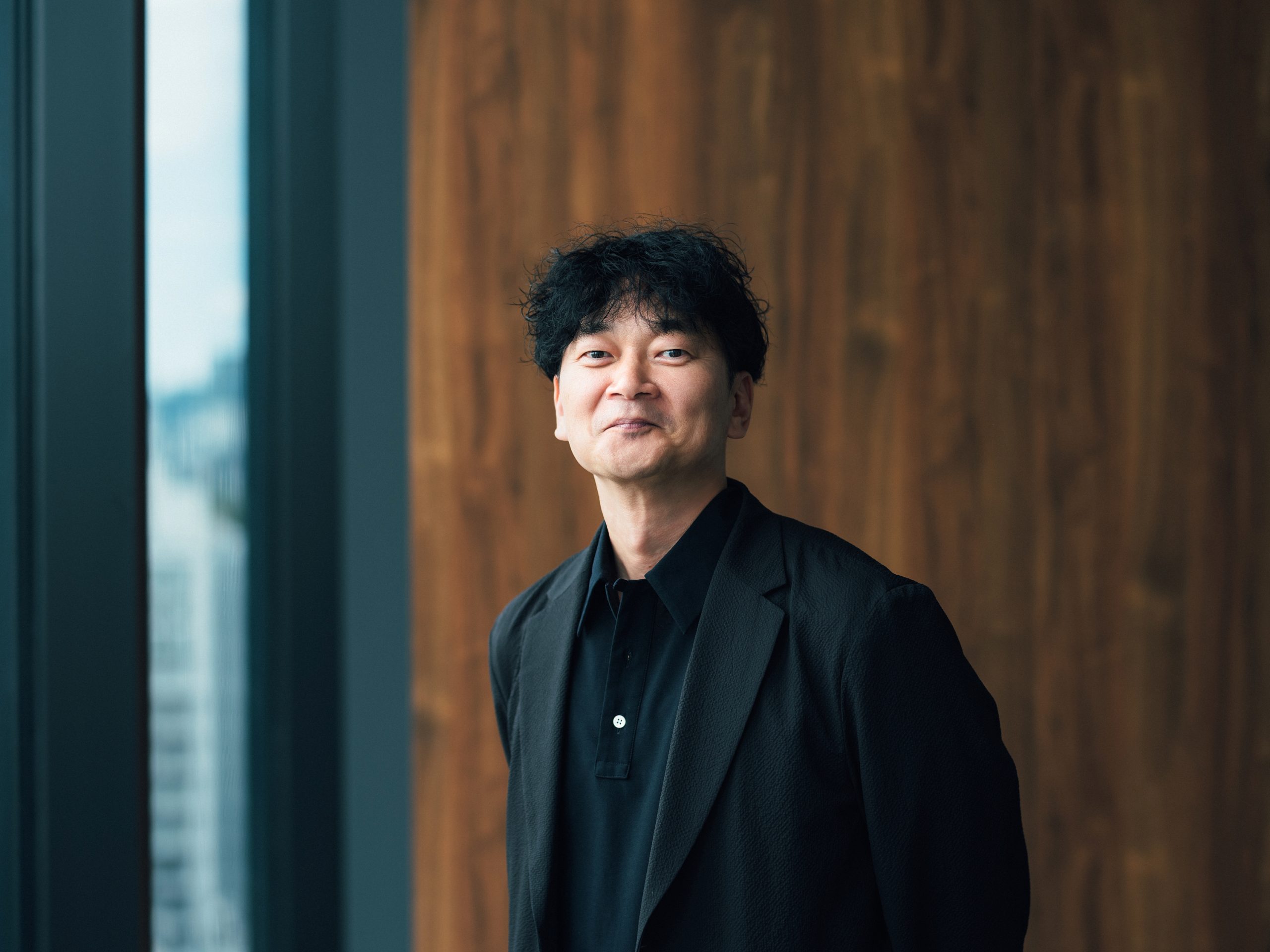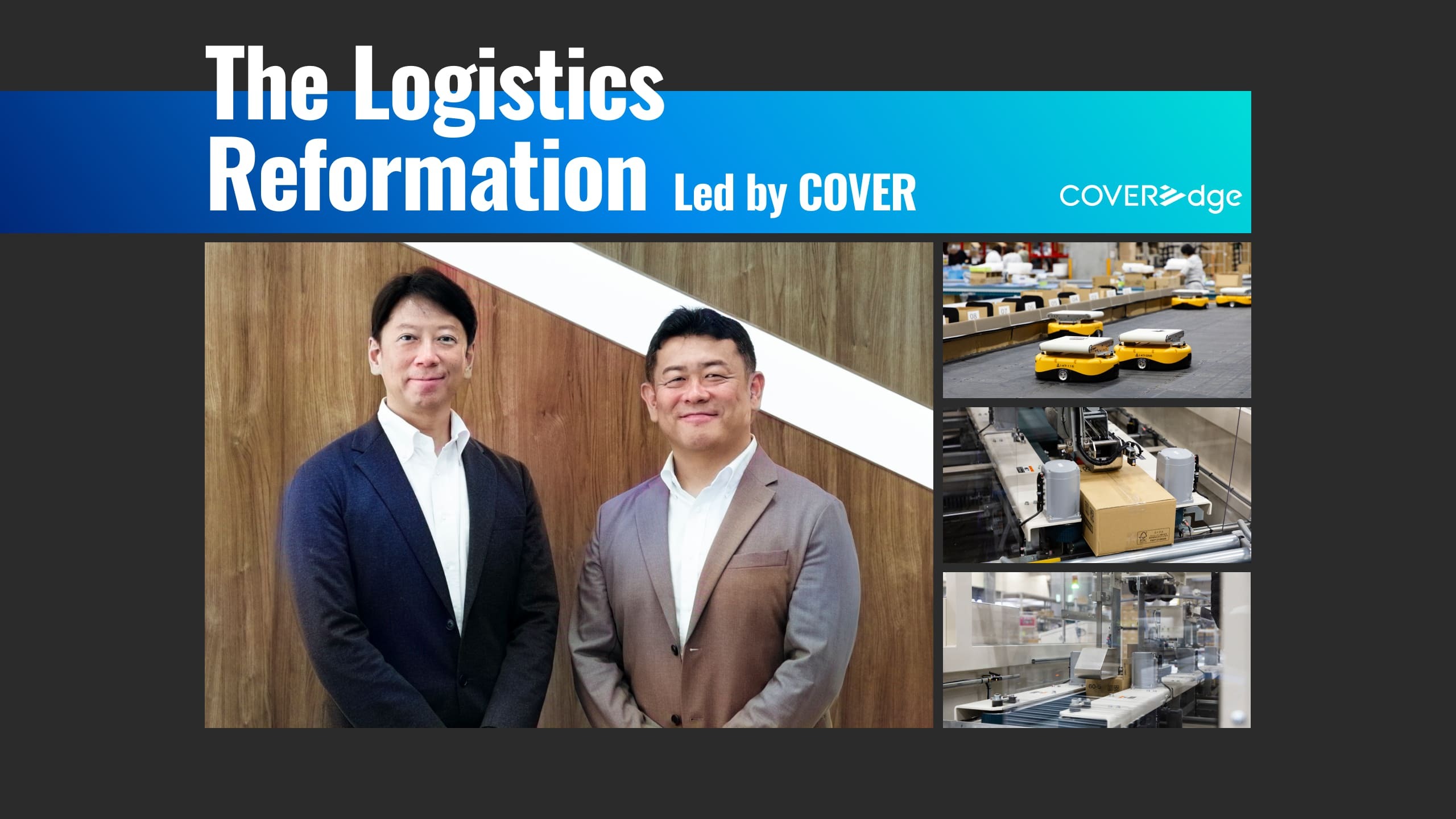
COVER Corporation, the home of the VTuber agency hololive production, is aiming to be a major player in the general entertainment space, and behind the scenes of the company’s rapid rise is Takashi Kato, who supervises the now Administration Department that supports the activities and work of COVER’s talents and staff alike (along with also being the head of the Human Resources and Legal and Intellectual Property/Crisis Management Departments). Kato joined the company in 2020 before assuming the position of Senior Vice President, and has helped formulate COVER’s unique management structure that is the basis of its VTuber business. We asked Kato to talk a bit about the initiatives in place that are helping create the company’s sustainable organizational structure.
Supporting VTubers and Talents: COVER’s Unique Management Structure
―I understand that you, Kato, joined COVER in 2020 as the head of both the Administration and Human Resources Department, but please tell us about your career path up until joining COVER and what your job involves currently.
I joined Japan Post as a new graduate, before getting my certified public accountant license and taking on a position at Deloitte Touche Tohmatsu. I then worked at a start-up as a COO, until I was hired by COVER in 2020 through a recruitment agency, and I have been here for 5 years. Looking back now, I feel like I have gained a range of knowledge and experience I can draw upon from my time at both very large and start-up companies as well as being involved with the governance of various companies during my time in auditing.
This knowledge has been really helpful in dealing with various issues at COVER in a flexible manner, and has been indispensable in the company’s rapid expansion from an organization with tens of employees to now hundreds. When I first started, I was initially tasked with HR and accounting work, as well as taking on legal-related duties such as contract checks, before gradually working on developing our general affairs functions. Now, we have developed an organizational structure where administration, human resources and legal and intellectual property/crisis management all have their own dedicated departments.
Unique to COVER is its talent support functions. Our Talent Management Department looks after our talents’ main duties, while we handle the procedural side of things that Talent Management isn’t able to do. The fact that we have to handle administrative matters regarding both talents and staff is something unique to our back office I think.
―Please tell us more about your efforts to create a safe environment for talents, and managing risks specific to the talent business.
We have continued to develop talent support initiatives in stages since around 2020, from company establishment support and the introduction of tax accountants, to slowly increasing business-related support and last year introducing a health check-up system. We heard from talents that they were having trouble managing their health when their activities ramp up, so we are providing more opportunities for talents to undergo regular health examinations, including talent-oriented counseling and mental health care services.
For overseas talents, it is particularly important that they are in an environment where they are able to stream properly: we make sure that talents visiting Japan from abroad are in a location that has all of the right streaming equipment because the Wi-Fi at regular hotels isn’t very reliable and can interfere with talents’ livestreams. Another important part of our job is helping talents get their entertainment visas.
This kind of support is handled by our Talent Administration Support Team in the Administration Department, but we collaborate closely with the Talent Management Department as well. Although we don’t have a lot of direct contact with the talents themselves, we do deal with their managers for a variety of reasons.
Regarding risk management, we check and warn talents about any content of livestreams in advance and have a team dedicated to managing comments to prevent trolling during such streams. We also have crisis management processes in place to deal with unforeseeable incidents step by step, from coordinating with related divisions when the incident first happens, to addressing external parties.
We have continued to resolutely resolve issues we are faced with, which has led to these initiatives as they are today, and we will continue to provide talents with the best environment possible for them to conduct their activities with peace of mind.

The Path to Organizational Reform in a Growing Company: Taking on Reasonable Challenges
―You must have seen the company undergo tremendous change from when you first started up until now, but, from the perspective of the Administration Department, have there been any changes you have noticed that left an impression on you?
While we handle requests from other divisions as flexibly as possible, there is a risk, in line with the rapid expansion of the company, that we may not handle such matters fairly all the time. Accommodating individuals may be unfair towards other divisions, and could potentially increase the risk of an unexpected incident, and now that the company has expanded as much as it has, matters that we may have handled by playing it by ear previously now need to be dealt with more seriously.
At COVER, we have a culture of welcoming bold proposals, but in recent years, we have been focusing on taking on more challenges backed by sound reasoning: in particular, considering the rationale behind a proposal and establishing clear accountability processes. We still very much adopt new ideas that come from those on the ground, but management is now more across who is responsible for a proposal or who will own said project, etc. than previously and we have appropriate decision-making processes in place.
While it is inevitable that as an organization grows it also becomes more rigid, this has been a necessary change to ensure that company-wide operations are in good order. Along with this, we are also striving to create management structures that support the growth of our company and are also fair and flexible, as we aim to achieve sustainable growth.

More Opportunities to Consider Company-Wide Optimization
―You took on the role of Senior Vice President (SVP) in 2023, but what kind of changes did you experience compared to prior to the role change?
I became SVP at the time that we were first introducing the SVP system as part of our IPO preparations, and the biggest change was to the decision-making processes. We had more opportunities to catch up on requests and issues from various divisions through management-level discussions and I felt more responsibility on a daily basis as a manager that was expected to make decisions from a more senior position.
A particular conscious change is that I now have more opportunities to think about optimization on a company-wide level. My daily decision-making regarding such things as system structures and handling issues now goes beyond just coordinating with other departments, but now I am constantly thinking about what is best for the company as a whole.
But crucial to these changes is the existence and consistency of our meetings. In addition to department head meetings, we also touch on the direction certain divisions/teams are heading and make various decisions in management meetings to constantly stay up to date on the status of the company as a whole. In the beginning I thought of it as a formal position, but being a SVP is different from a regular department head in that I am responsible for making a wider range of decisions.
―What are some ways you have improved within the organization as head of HR?
A prominent feature of COVER is that we have a lot of dedicated and highly-skilled staff working for us, but at times, the serious nature of some people can lead to a difference of opinions and friction between divisions. Therefore, we are continuously finding new ways to become “united without boundaries,” one of our company values.
One area we are placing a lot of importance on is promoting the careful consideration of other divisions. We are continually finding new ways to deepen employees’ understanding of each other’s projects and issues they’re facing through regular communication to build better cooperative relationships.
But rather than specific large-scale initiatives, we are focusing more on regular opportunities to communicate with each other. For example, we have presentations from different divisions at our monthly company-wide meeting and hold social events where people can bond over mutual hobbies such as trading card games etc.
―ホロカでの交流が!
Exactly! The Human Resources Department holds classes for beginners that any employee can freely attend where one can learn how to create their own deck. These are usually popular events with around 10-20 people in attendance.
As well as this, on the 14th floor of our building, we have a large relaxation room that can fit up to 100 people, where we also hold regular “TGIF” (or Thank God It’s Friday) staff parties, which are great opportunities for staff from overseas to get together. We usually give people 1-2 weeks’ notice about these HR-led parties and get around 100 people coming each time – another great way to promote internal communication.
Another form of communication we are trialing is regular townhall meetings where employees have the chance to speak directly to CEO Motoaki Tanigo, and we plan to include other directors and advisors too for more transparent internal communication. These kinds of initiatives allow staff members to make deeper connections within the company regardless of division/team or nationality as we aim to promote an organizational culture that is as open as possible. We won’t see too many results from the first or even the second time we hold such a meeting, but if we continue to provide these sorts of opportunities, we will gradually be able to see an increase in mutual understanding between departments, which will lead to more natural collaboration.
―What kind of systems and training are in place to train and develop staff?
We have expanded many staff development initiatives based on the feedback received from staff members themselves by increasing the budget for training systems, and providing a variety of programs suited to the level and role of employees.
For managers, we offer a range of training programs that cover compliance and improving one’s management skills. While these are intended to be mandatory programs, we also offer voluntary training for each division/team to provide flexible learning opportunities tailored to one’s job and skillset.
Regular employees undergo training courses in such areas as logical thinking and facilitation. We have also included business etiquette training in response to requests from staff as we have many employees joining COVER from other media-related industries.
As we continue to expand our business on a global level, we have been putting a lot of effort into training that focuses on increasing cross-cultural communication and understanding by inviting guest lecturers to talk on various related topics and then continuing to provide opportunities for staff to reinforce learned concepts among peers. We actively invest in individual upskilling by offering learning assistance schemes to financially support employee learning and by supporting long-term career development through voluntary holding company operations.
In the future, we want to create model cases for employee career pathways as we feel it is important to clearly demonstrate the diverse career pathway options available at such a rapidly growing company.
Reaching Global Standards: The Steady Development of the Entertainment Industry

―What is your main focus as head of the Legal and Intellectual Property/Crisis Management Department as COVER ramps up its global expansion efforts?
Although we are continuously receiving numerous applications from highly skilled creatives, we are continuing to increase our proactive recruiting efforts focusing more on business and corporate skillsets. While we are currently focused on recruiting those who can speak both Japanese and English, we expect to see an increase in English-only speakers in the future as well.
Part of the focus of the HR Department is currently on creating an organization and implementing systems in line with our overseas expansion, while drawing upon the knowledge and experience from those in management at other IT companies. We have a number of employees who don’t speak English that well, but rather than demanding that employees improve their English proficiency, we have taken more of a cross-cultural understanding approach. Our translation teams help us overcome language barriers, allowing us to focus more on the mutual understanding of cultural differences such as attitudes towards deadlines and quality.
Our translation division is divided into two teams: the Bridge Team that focuses more on the Japanese-English translation of internal documents, etc. while our Localization Team handles the translation of content for external use. Both teams are involved in a wide variety of areas with the Bridge Team providing simultaneous interpreting for our monthly company-wide meetings, and the Localization Team providing multilingual subtitles for our hologra anime and song cover videos for instance. We often get comments from new employees who are pleased that such services exist, and we hope to continue to create an environment that is easy to work in for employees despite their cultural and value differences.
―Are there any issues in the industry surrounding COVER? How are you dealing with such issues?
In recent years within the entertainment industry, anime in particular has seen a significant increase in the demand for proper compliance. This isn’t just demanded of us as a publicly listed company, but as the result of a structural shift within the industry as a whole.
In fact, the anime market has grown two-fold over the last 10 years to be currently worth over 3 trillion yen, and of this, 1.6 trillion yen is in the Japanese market alone. It is now to the point where anime has lost the ‘Cool Japan’ tag and is now considered to be a major industry on the global stage. However, for a while there, admittedly, our creators were handling excessive workloads, but a report from the United Nations Commission of Inquiry in October 2023 shedding light on labor conditions within the anime industry has garnered international attention on the issue (with discussions reaching the point of whether or not to release details on Netflix, etc.) causing the industry to rethink and apply global standards to traditional working methods that have propped up the anime industry up until now.
We are fully aware of these issues having received our own recommendations with regards to the Subcontractor Act in Japan. For our hard-working creators, we need to adopt measures that may be seen as rather strict regulations at times, but this is a necessary path we have to take for the betterment of the industry as a whole.
To address this, we are implementing measures such as improvements to workflows and eliminating excessive working hours by working with the Corporate Planning Office in particular to come up with fundamental ways to resolve such structural issues. We also feel like we are coming together as an industry through collaborations with other companies in the industry and media mix projects.
As a company at the forefront of the industry, here at COVER we are not content with just simply addressing compliance issues, but rather proactively providing information and making efforts to ensure the steady development of the industry as a whole. This is absolutely necessary to continue to develop Japanese anime and VTubing as an entertainment industry we can be proud of, which includes improving our efforts in ensuring that talents and creators can thrive under sustainable working conditions.
――What word or phrase do you think best describes COVER as of right now?
I feel COVER is now ‘a company entering adulthood,’ having felt the importance of making sure we have sturdy foundations as a company particularly over the last year.
And I don’t mean this in a conservative way, but rather, while it is still important for us to be ‘young at heart’ when taking on new challenges and daring to dream, it has now become far more crucial for us to balance that out with appropriate risk management strategies. We are now aiming to find that delicate middle ground between being too ‘childish’ and too ‘grown-up’ and making sure we are achieving sustainable growth alongside our creators.
Now that entertainment is being recognized as one of Japan’s major exports, the creator economy that we at COVER have established has now opened the door for greater possibilities in the market. We are so excited for the future and to give creators worldwide an opportunity at success by offering a platform that, while originating from Japan, is globally accepted.

ー Thank you very much!
役員インタビュー一覧
-
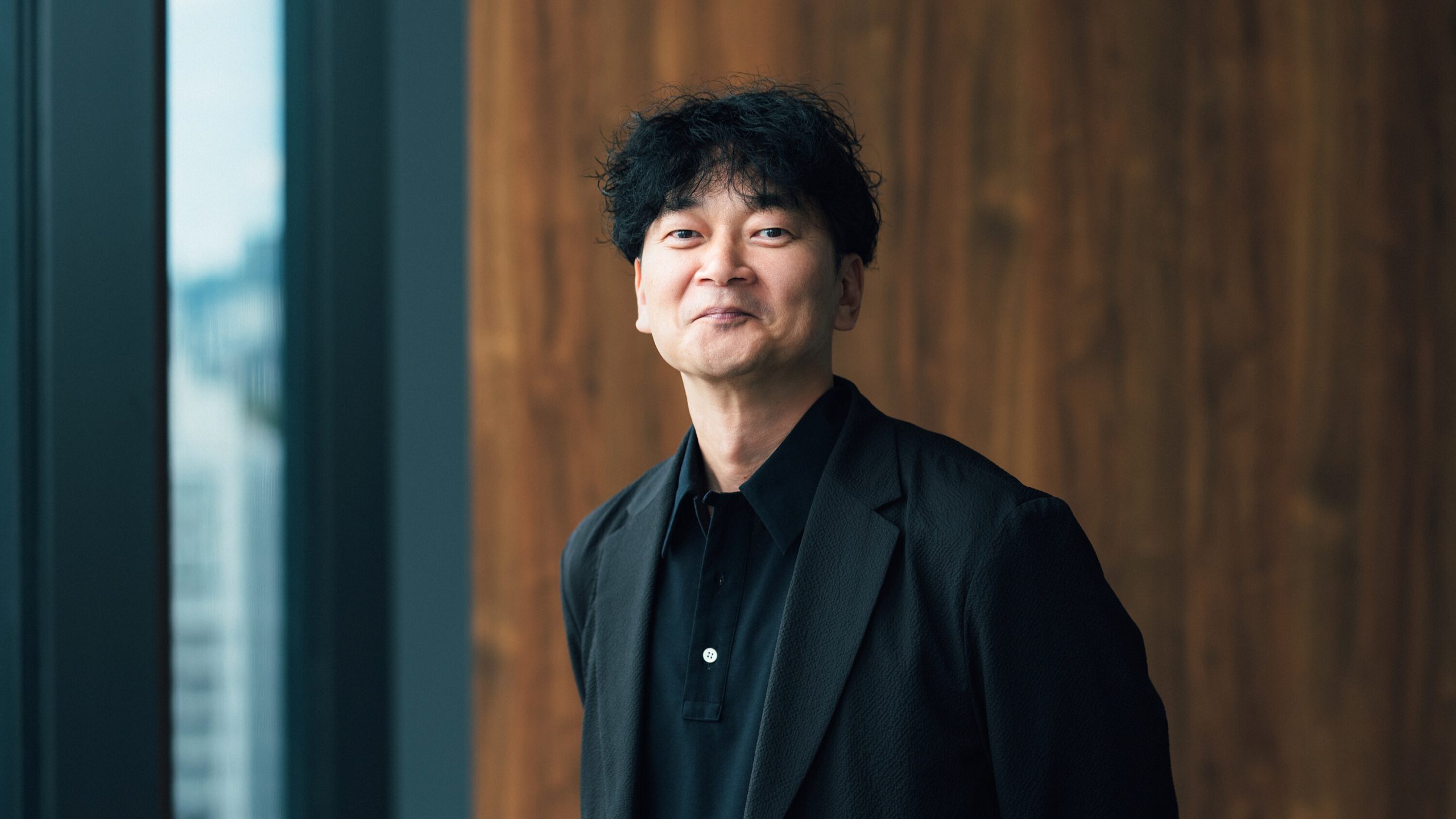
カバー取締役・植田修平が語る、世界のコンテンツ産業に不可欠な存在への挑戦
メディアミックス領域を管掌する取締役の植田修平さんに、VTuber市場の未来、海外展開戦略、そして業界が抱える本質的な課題について、詳しく伺いました。
記事を読む
-

「クリエイターの夢を管理部門から支える」カバー執行役員が描く、挑戦を後押しする組織づくりへの挑戦
執行役員 人事/法務知財・危機管理本部長の加藤卓さんに持続可能な組織づくりを目指す取り組みについて、詳しく伺いました。
記事を読む
-
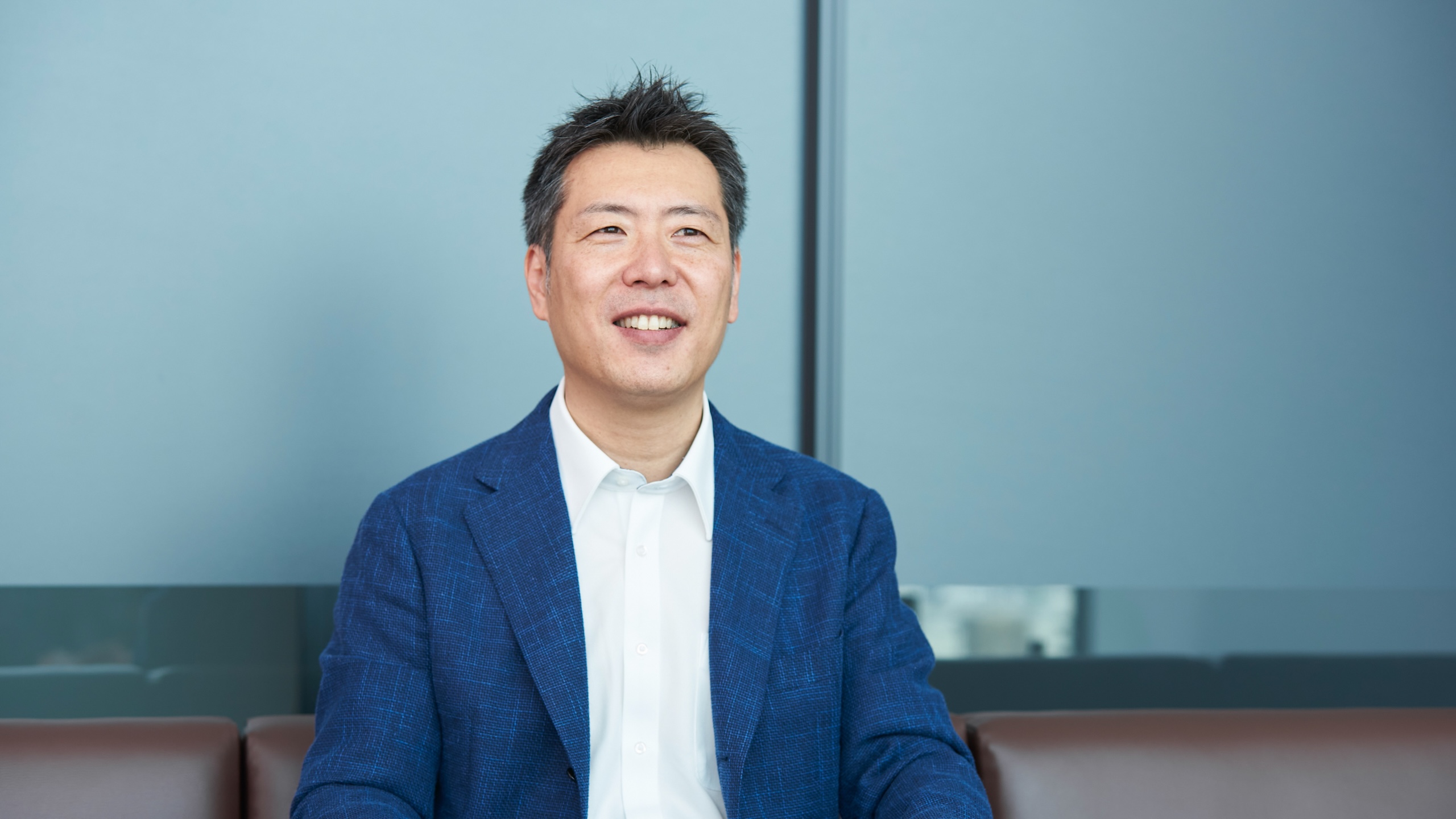
「多彩な専門性で描くVTuberの未来」カバー林執行役員が語る、クリエイティブ制作本部が挑む表現革新への道のり
VTuberプロダクション領域を管掌する執行役員の林茂樹さんに、新しいエンターテインメントの創造に挑む制作現場について、詳しく伺いました。
記事を読む
-

「一過性のブームではない、10年先を見据えたビジネスへ」カバーCFOが描く、VTuber産業の可能性と展望
取締役CFOの金子陽亮さんに、カバーの成長戦略や将来展望について詳しく伺いました。
記事を読む
-
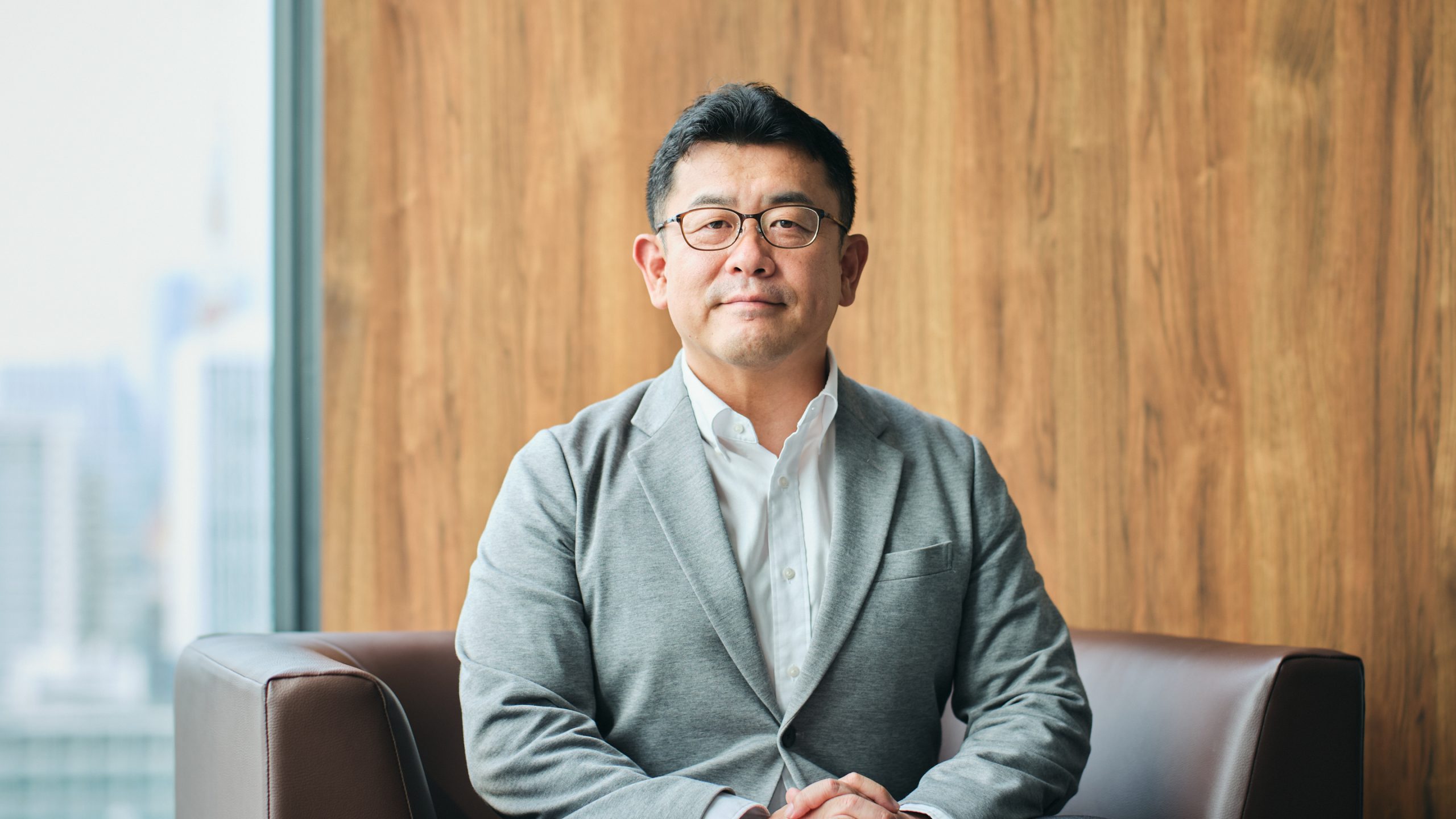
「日本発コンテンツを世界に届けたい」カバー前田執行役員が明かす、グローバル展開への挑戦と展望
MD・EC・物流領域を管掌する執行役員の前田大輔さんに、カバーのEC戦略と未来のビジョンについて詳しく伺いました。
記事を読む
-

「テクノロジーで世界を縮める」カバー取締役CTOが語る、VTuberからホロアースまでの技術革新と未来像
カバー創業期から技術戦略を牽引してきた福田一行CTOに、技術革新を続けるカバーの技術戦略や、新しいエンターテインメントの未来を創造する挑戦について、詳しく伺いました。
記事を読む
-

「日本発で世界に向けてエンターテイメントで突き抜ける」カバー谷郷社長が描く、VTuber文化とテクノロジーが拓く未来
代表取締役社長CEO 谷郷 元昭に、「第二創業期」を迎えたカバーが目指す「より大きなチャレンジ」の全容について迫りました。
記事を読む



